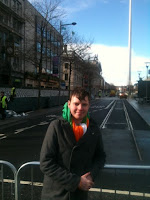This blog post spreads awareness of the condition known as autism and the behavioural disorder known as Asperger's Syndrome.
Autism is defined by Oxford Dictionaries (2016) as 'a mental condition, present from early childhood, characterized by great difficulty in communicating and forming relationships with other people and in using language and abstract concepts.' The Pocket Oxford Dictionary's definition is more concise, describing autism as a 'condition characterized by self-absorption and social withdrawal.'
There has also been progress on discovering more about Asperger's Syndrome - 'a developmental disorder related to autism and characterized by awkwardness in social interaction...and preoccupation with very narrow interests' (Oxford Dictionaries, 2016). In addition to social interaction difficulties, the National Autistic Society also notes the other two elements of 'the triad of impairments' - social communication and social imagination. Asperger's syndrome was named for the Austrian psychiatrist, Hans Asperger, who first identified it in 1944. However, it was not officially recognised for another half century (Autism Initiatives, 2016).
In contrast to the early 1990s, individuals and families coping with autism are receiving a lot more support from the state whether it be through the education or social services sector. However, more assistance is needed and further British and Irish government as well as Stormont cutbacks will only serve to deprive individuals and families of valuable support mechanisms. Unfortunately, there is also still a lot of ignorance shown to people with learning difficulties by wider society and this must continue to be challenged wherever it is found.
More information and resources on autism and Asperger's syndrome can be located at the following websites:
http://www.autism.org.uk/
http://autism.ie/
http://www.usautism.org/
http://www.autisminitiatives.org/
https://www.mencap.org.uk/
http://www.peatni.org/
References and further reading:
Autism Initiatives, 2016. 'What is Asperger syndrome?' Available at: <http://www.autisminitiatives.org/about-autism/what-is-asperger-syndrome/> [online] (accessed 28 May 2016).
Frith, U. 2003. 2nd edn. Autism: explaining the enigma. Oxford: Blackwell Publishing.
Haddon, M. 2004. The curious incident of the dog in the night time. London: Vintage Books.
Kennan, M., Kerr, K. and Dillenburger, K. eds. 2000. Parent's education as autism therapists. London: Jessica Kingsley Publishers.
Oxford Dictionaries. 2016. 'Asperger's Syndrome'. Available at: <http://www.oxforddictionaries.com/definition/english/asperger%27s-syndrome?q=asperger%27s+syndrome> [online] (accessed 2 May 2016).
Oxford Dictionaries. 2016. 'Autism'. Available at: <http://www.oxforddictionaries.com/definition/english/autism> [online] (accessed 2 May 2016).
Stacey, P. 2003. The boy who loved windows: opening the heart and mind of a child threatened by autism. Bognor Regis: John Wiley & Sons Ltd.
Thompson, D. ed. 1992. 8th edn. The pocket Oxford dictionary of current English. Oxford: Oxford University Press.
